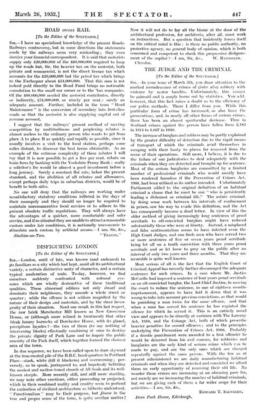ROAD versus RAIL [To the Editor of the SPECTATOR.] Sue,—I
have no specialized knowledge of the present Roads- Railways controversy, but in some directions the statements made by the railways seem very misleading ; they even deceive your financial correspondent. It is said that motorists suppiy only 120,000,000 of the 160,000,000 required to keep up the roads but, Sir, the heavier tax on the motorist, both private and commercial, is not the direct licence tax which accounts for the £20,000,000 but the petrol tax which brings to the Exchequer about /34,000,000. That this stun is not indeed paid directly to the Road Fund brings no noticeable consolation to the small car owner or to the 'bus companies. Of the £60,000,000 needed the motorist contributes, directly or indirectly, 154,000,000, or ninety per cent.: surely an adequate amount. Further, included in the term Road Maintenance " is the conversion of secondary into first-class roads so that the motorist is also supplying capital out of revenue account.
• I suggest that the railways' present method of meeting competition by multitudinous and perplexing rebates is almost useless to the ordinary person who wants to get from place A to place B as quickly and rapidly as possible, since it usually involves a visit to the local station, perhaps some miles distant, to discover the best terms obtainable. As an example of the extreme complexity of these rebates I will say that it is now possible to get a five per cent. rebate on train fares by banking with the Yorkshire Penny Bank : really a solicitor's fee would be almost a good investment before a Jung journey. Surely a constant flat rate, below the present standard, and the abolition of all rebates and allowances, except perhaps daily trips in suburban districts, would be of benefit to both sides.
No one will deny that the railways are working under unsatisfactory statutory conditions inflicted in the days of their monopoly and they should no longer be required to maintain unremunerative local services or to adhere to the present obsolete traffic regulations. They will always have the advantages of a quicker, more comfortable and safer serVien, and if so situated they are tillable to attract a reasonable custom under fair conditions, it is nationally uneconomic to stimulate such custom by artificial means.—I ant, Sir, &c.,


































 Previous page
Previous page